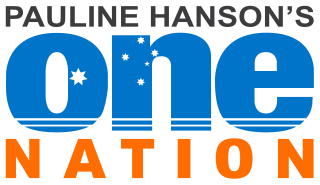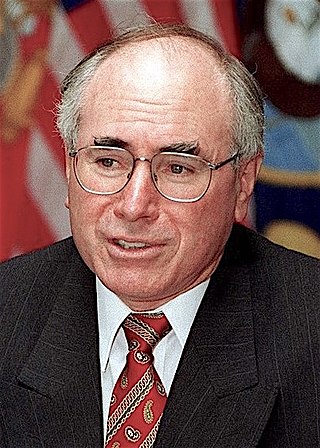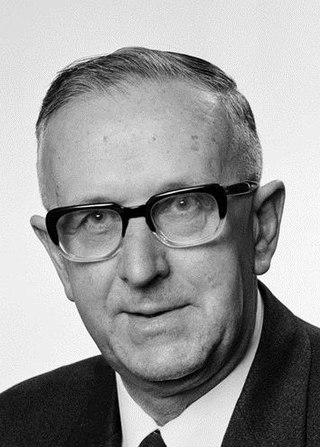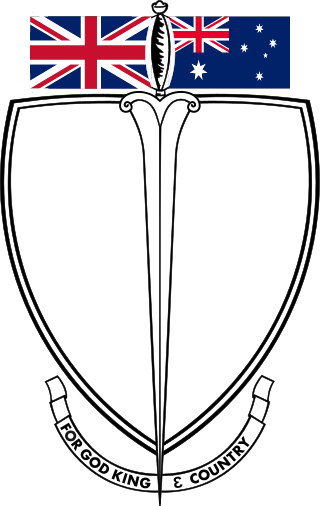Related Research Articles

The Liberal Party of Australia is a centre-right political party in Australia, one of the two major parties in Australian politics, along with the centre-left Australian Labor Party. It was founded in 1944 as the successor to the United Australia Party and has since become the most successful political party in Australia's history.

Pauline Hanson's One Nation, also known as One Nation or One Nation Party, is a right-wing populist political party in Australia. It is led by Pauline Hanson.
David Ernest Oldfield is a former Australian politician who co-founded and was deputy leader of the Pauline Hanson's One Nation party.

The 1996 Australian federal election was held to determine the members of the 38th Parliament of Australia. It was held on 2 March 1996. All 148 seats of the House of Representatives and 40 seats of the 76-seat Senate were up for election. The centre-right Liberal/National Coalition led by Opposition Leader John Howard of the Liberal Party and coalition partner Tim Fischer of the National Party defeated the incumbent centre-left Australian Labor Party government led by Prime Minister Paul Keating in a landslide victory.

The Australia First Party (NSW) Incorporated, often shortened to the Australia First Party (AFP), is an Australian far-right political party founded in 1996 by Graeme Campbell. The policies of Australia First have been described as ultranationalist, anti-multicultural and economically protectionist. The party's logo includes the Southern Cross of the Eureka Flag.

The Nuclear Disarmament Party (NDP) was an Australian political party formed in June 1984. It was founded by medical researcher Michael Denborough as the political arm of the Australian anti-nuclear movement, which had been active since the early 1970s.

The Family First Party was a conservative political party in Australia which existed from 2002 to 2017. It was founded in South Australia where it enjoyed its greatest electoral support. Since the demise of the Australian Conservatives into which it merged, it has been refounded in that state as the Family First Party (2021), where it contested the state election in 2022, but failed to win a seat.

The Liberal–National Coalition, commonly known simply as "the Coalition" or informally as the LNP, is an alliance of centre-right political parties that forms one of the two major groupings in Australian federal politics. The two partners in the Coalition are the Liberal Party of Australia and the National Party of Australia. Its main opponent is the Australian Labor Party (ALP); the two forces are often regarded as operating in a two-party system. The Coalition was last in government from the 2013 federal election, before being unsuccessful at re-election in the 2022 Australian federal election. The group is led by Peter Dutton, who succeeded Scott Morrison after the 2022 Australian federal election.

Francis Patrick Vincent McManus, Australian politician, was the last leader of the parliamentary Democratic Labor Party and a prominent figure in Australian politics for 30 years.

The Liberal Democratic Party, shortened as LDP, Liberal Democrats, or Lib Dems, is an Australian political party founded in Canberra in 2001. The party espouses smaller government and supports policies that are based on classical liberal, libertarian principles, such as lower taxes, opposing restrictions on civil liberties, decentralisation, utilising nuclear energy, and the relaxation of smoking laws.

Nick Xenophon is an Australian politician and lawyer who was a Senator for South Australia from 2008 to 2017. He was the leader of two political parties: Nick Xenophon Team federally, and Nick Xenophon's SA-BEST in South Australia.

James Saleam is an Australian far-right extremist and the chairman of the Australia First Party. Saleam has been described as a white nationalist, who has been a strong advocate of barring further immigration to preserve a "self-contained, predominantly white nation resistant to further immigration or watering-down of its culture". This is often considered ironic since Saleam is ethnically Lebanese; indigenous people of the Middle East, and in fact all non-Europeans, were barred from immigrating to Australia until the 1950s under the White Australia policy. He has been observed wearing a swastika armband and associating with neo-Nazi skinheads.
Environmentalists for Nuclear Energy Australia, formerly called Conservatives for Climate and Environment, was a political party registered in Australia from 2007 to 2010. EFN-Australia referred to itself as a not-for-profit environmental association, registered as a political party. It was the Australian affiliate of Environmentalists for Nuclear, and the party campaigned unsuccessfully to gain nuclear power in Australia.
The Progress Party, initially known as the Workers Party, was a minor political party in Australia in the mid-to-late 1970s. It was formed on 26 January 1975, as a free-market right-libertarian and anti-socialist party, by businessmen John Singleton and Sinclair Hill, in reaction to the economic policies of Labor prime minister Gough Whitlam. It operated and ran candidates in Western Australia, the Northern Territory, South Australia, Queensland and New South Wales, but it did not have a central federal structure. Its Western Australian affiliate, which advocated secession from the rest of Australia, did particularly well in the area surrounding Geraldton in the state's Mid West. However, the party failed to win seats at any level of government and had gone out of existence by 1981.
Meredith Hunter, Australian politician, is a former member of the multi-member unicameral Australian Capital Territory Legislative Assembly representing the electorate of Ginninderra for the ACT Greens from 2008 to 2012. She was also the Parliamentary Convenor of the ACT Greens.

Katter's Australian Party (KAP) is an agrarian political party in Australia. It was founded by Bob Katter, an independent and former Nationals MP for the seat of Kennedy, with a registration application lodged to the Australian Electoral Commission in 2011.

The Centre Party, or the Centre Reform Group, and occasionally referred to as the Centre Movement, was a short-lived extreme-right political party that operated in the Australian state of New South Wales. Founded in December 1933, the party's leader and most prominent figure was Eric Campbell, the leader of the paramilitary New Guard movement. That organisation had been established to oppose what its members perceived as the socialist tendencies of Jack Lang, the Premier of New South Wales, but declined following Lang's dismissal in early 1932. The party, unlike most fascist-oriented parties in Europe, acted as a wing of its more prominent paramilitary arm.
Centre Alliance, formerly known as the Nick Xenophon Team (NXT), is a centrist political party in Australia based in the state of South Australia. It currently has one representative in the Parliament, Rebekha Sharkie in the House of Representatives.

Identity Ireland was a political party in Ireland. A right-wing to far-right party, it never achieved electoral representation at local or national level. It was launched in Dublin on 22 July 2015. Its founders were Gary Allen, Peter O'Loughlin and Alan Tighe. O'Loughlin, the party's national spokesperson, contested the 2016 Irish general election and 2019 European Parliament election. As of 2023, the party is defunct.

Yellow Vest Australia (YVA), until 9 April 2019 known as the Australian Liberty Alliance (ALA), was a minor right-wing to far-right political party in Australia. The party was founded by members of the Q Society and has been described as the political wing of Q Society. The leader was Debbie Robinson (President), who was also national president of the Q Society. On 4 September 2020, the Australian Electoral Commission removed the Yellow Vest Australia from the registered political party list.
References
- ↑ Moore, Andrew (1995). The Right Road?: A History of Right-Wing Politics in Australia. Oxford University Press. pp. 118–119. ISBN 019553512X.
- ↑ "Greys see red after having party blue". The Canberra Times . 15 May 1989.
- ↑ "Greypower tries to organise as critics speak out". The Canberra Times . 20 March 1989.